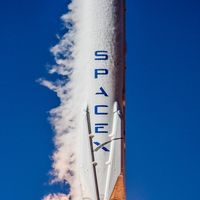Turbulent Times for Musk's Empire: Cranes, Cars, and Controversies
June 27, 2025, 4:09 pm

Location: United States, Kansas, Winfield
Employees: 1001-5000
Founded date: 2011
Total raised: $820K

Location: United States, District of Columbia, Washington
Employees: 5001-10000
Founded date: 2002
Total raised: $7.53B
Elon Musk's empire is facing a storm. A crane collapse at SpaceX's Texas facility has raised alarms, while Tesla's leadership shake-up reflects deeper issues. The Occupational Safety and Health Administration (OSHA) is now investigating the crane incident, which has become a focal point of scrutiny for Musk's ambitious ventures. Meanwhile, the firing of Tesla's vice president of manufacturing, Omead Afshar, signals trouble in the automotive giant's ranks.
The crane collapse at SpaceX's Starbase was captured live, a spectacle that quickly spread across social media. This incident is not just a mishap; it’s a reflection of the pressures mounting on Musk's companies. SpaceX has been in the spotlight for a series of mishaps involving its Starship Super Heavy rocket. Each explosion has echoed through the industry, raising questions about safety and environmental impact. Environmental activists are voicing concerns about the damage to wildlife and habitats, painting a picture of a company racing ahead without looking back.
OSHA's involvement adds another layer of complexity. The agency's resources have been slashed recently, thanks to Musk's push to reduce federal oversight. This raises eyebrows. Can we trust a company that operates under such constraints? The history of workplace injuries at SpaceX is troubling. Reports indicate that injuries exceed industry averages. A past tragedy, where an employee lost his life due to unsafe conditions, looms large over the company’s reputation.
In the world of Tesla, the narrative is no less dramatic. The firing of Omead Afshar comes on the heels of declining car sales. This isn’t just a minor setback; it’s a wake-up call. Tesla's stock has plummeted, down 19% this year. The company is losing ground in key markets, particularly in Europe, where sales have dipped for five consecutive months. Customers are gravitating toward local brands and more affordable electric vehicles from China. The competition is fierce, and Tesla is feeling the heat.
Afshar's departure is significant. He was a key player, leading a team that included high-level executives responsible for sales across North America and Europe. His firing suggests that Musk is not afraid to make tough decisions. But it also raises questions about the stability of Tesla's leadership. Afshar had previously faced scrutiny over an internal investigation regarding his procurement practices. Now, he’s out, leaving a void in the manufacturing department.
Musk's management style is often described as intense. He demands results, and when they don’t come, heads roll. This approach has worked in the past, propelling Tesla and SpaceX to the forefront of their industries. However, the current climate suggests that this strategy may be backfiring. The combination of declining sales, leadership changes, and safety concerns paints a picture of a company in turmoil.
The broader implications of these events are significant. SpaceX has secured over $20 billion in federal contracts, primarily from NASA and the Department of Defense. However, with the proposed lean budget for NASA still pending congressional approval, the future of these contracts hangs in the balance. If funding is cut, SpaceX could face challenges that ripple through its ambitious plans for Mars colonization.
Musk's political entanglements further complicate matters. His financial backing of Donald Trump and controversial endorsements have drawn criticism. The fallout from these actions has tarnished Tesla's brand. The company is not just selling cars; it’s selling a vision. When that vision is clouded by political controversies, it affects consumer perception.
As the dust settles from the crane collapse and the firing of Afshar, one thing is clear: Musk's empire is at a crossroads. The ambitious goals of reaching Mars and revolutionizing transportation are overshadowed by immediate challenges. Safety concerns, declining sales, and leadership instability are all part of the narrative.
The question remains: can Musk navigate this storm? His track record suggests resilience. He has faced setbacks before and emerged stronger. However, the stakes are higher now. The world is watching. Investors are anxious. Consumers are questioning.
In the coming months, the focus will be on how Musk addresses these challenges. Will he implement changes to improve safety at SpaceX? Will Tesla find a way to regain its footing in the competitive automotive market? The answers will shape the future of his companies.
In the end, Musk's empire is a testament to ambition and innovation. But ambition without accountability can lead to disaster. As the investigations unfold and the market reacts, the true test of Musk's leadership will be revealed. Can he steer his companies through turbulent waters and emerge unscathed? Only time will tell.
The crane collapse at SpaceX's Starbase was captured live, a spectacle that quickly spread across social media. This incident is not just a mishap; it’s a reflection of the pressures mounting on Musk's companies. SpaceX has been in the spotlight for a series of mishaps involving its Starship Super Heavy rocket. Each explosion has echoed through the industry, raising questions about safety and environmental impact. Environmental activists are voicing concerns about the damage to wildlife and habitats, painting a picture of a company racing ahead without looking back.
OSHA's involvement adds another layer of complexity. The agency's resources have been slashed recently, thanks to Musk's push to reduce federal oversight. This raises eyebrows. Can we trust a company that operates under such constraints? The history of workplace injuries at SpaceX is troubling. Reports indicate that injuries exceed industry averages. A past tragedy, where an employee lost his life due to unsafe conditions, looms large over the company’s reputation.
In the world of Tesla, the narrative is no less dramatic. The firing of Omead Afshar comes on the heels of declining car sales. This isn’t just a minor setback; it’s a wake-up call. Tesla's stock has plummeted, down 19% this year. The company is losing ground in key markets, particularly in Europe, where sales have dipped for five consecutive months. Customers are gravitating toward local brands and more affordable electric vehicles from China. The competition is fierce, and Tesla is feeling the heat.
Afshar's departure is significant. He was a key player, leading a team that included high-level executives responsible for sales across North America and Europe. His firing suggests that Musk is not afraid to make tough decisions. But it also raises questions about the stability of Tesla's leadership. Afshar had previously faced scrutiny over an internal investigation regarding his procurement practices. Now, he’s out, leaving a void in the manufacturing department.
Musk's management style is often described as intense. He demands results, and when they don’t come, heads roll. This approach has worked in the past, propelling Tesla and SpaceX to the forefront of their industries. However, the current climate suggests that this strategy may be backfiring. The combination of declining sales, leadership changes, and safety concerns paints a picture of a company in turmoil.
The broader implications of these events are significant. SpaceX has secured over $20 billion in federal contracts, primarily from NASA and the Department of Defense. However, with the proposed lean budget for NASA still pending congressional approval, the future of these contracts hangs in the balance. If funding is cut, SpaceX could face challenges that ripple through its ambitious plans for Mars colonization.
Musk's political entanglements further complicate matters. His financial backing of Donald Trump and controversial endorsements have drawn criticism. The fallout from these actions has tarnished Tesla's brand. The company is not just selling cars; it’s selling a vision. When that vision is clouded by political controversies, it affects consumer perception.
As the dust settles from the crane collapse and the firing of Afshar, one thing is clear: Musk's empire is at a crossroads. The ambitious goals of reaching Mars and revolutionizing transportation are overshadowed by immediate challenges. Safety concerns, declining sales, and leadership instability are all part of the narrative.
The question remains: can Musk navigate this storm? His track record suggests resilience. He has faced setbacks before and emerged stronger. However, the stakes are higher now. The world is watching. Investors are anxious. Consumers are questioning.
In the coming months, the focus will be on how Musk addresses these challenges. Will he implement changes to improve safety at SpaceX? Will Tesla find a way to regain its footing in the competitive automotive market? The answers will shape the future of his companies.
In the end, Musk's empire is a testament to ambition and innovation. But ambition without accountability can lead to disaster. As the investigations unfold and the market reacts, the true test of Musk's leadership will be revealed. Can he steer his companies through turbulent waters and emerge unscathed? Only time will tell.